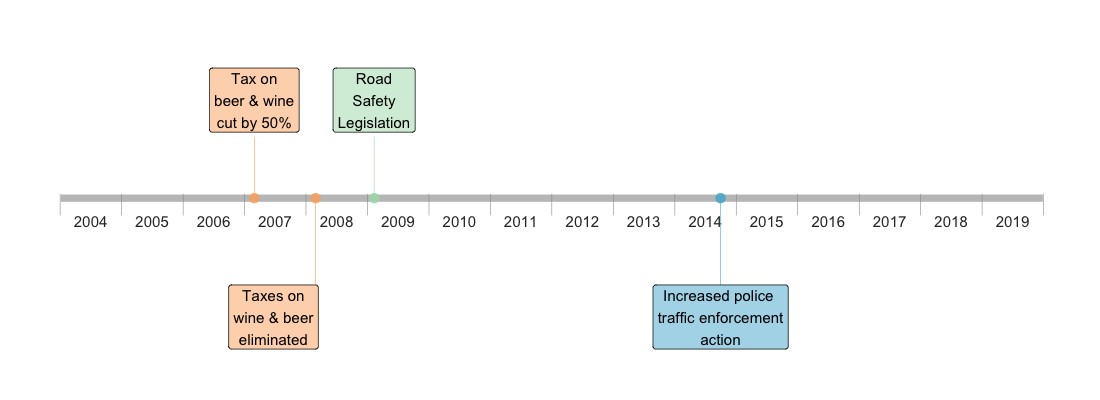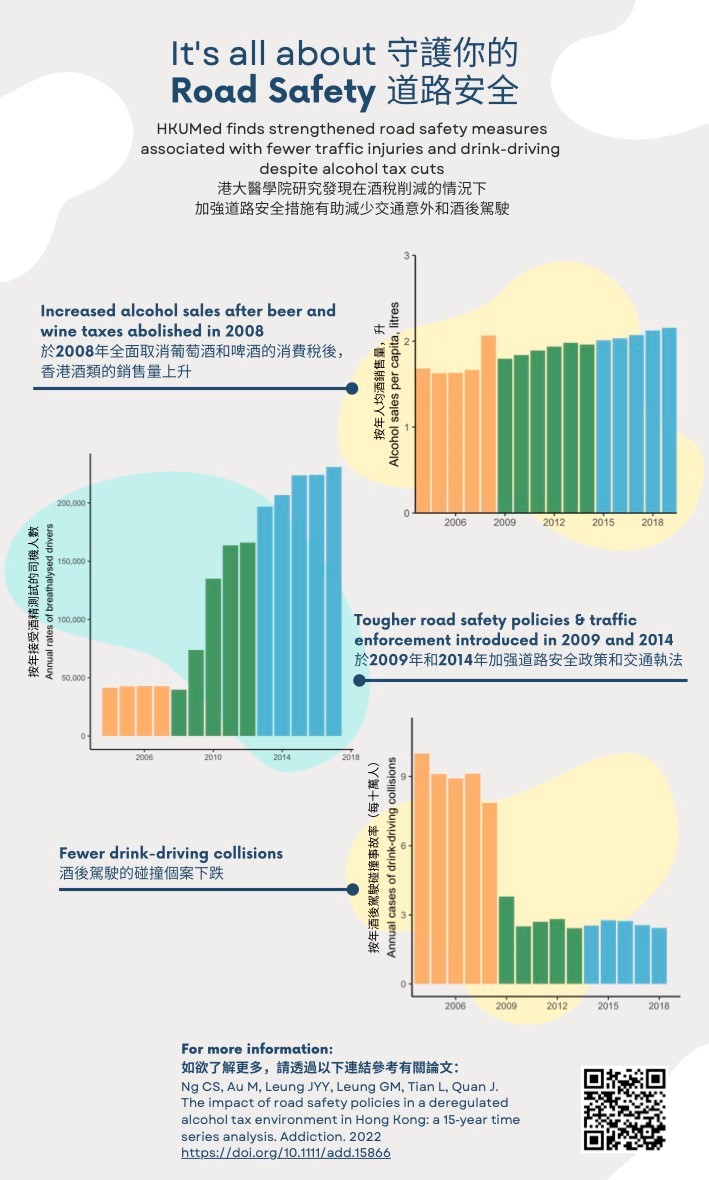25 April 2022
A study led by researchers from the Division of Health Economics, Policy and Management of the School of Public Health, LKS Faculty of Medicine at The University of Hong Kong (HKUMed) found that strengthened road safety policies were associated with reductions in road traffic injuries and drink-driving while taxes on beer and wine were eliminated in 2008. The study also identified a sustained decline in road traffic injuries linked to increased police traffic enforcement after the 2014. The findings are now published in the journal Addiction, published since 1884 by the Society for the Study of Addiction [link to the publication].
Background
Hong Kong cut excise taxes on wine and beer by half in February 2007 (from 80% and 40% respectively to 40% and 20%) and eliminated the taxes altogether in February 2008, leading to a steady increase in alcohol sales in Hong Kong over the last 15 years. Shortly afterwards, the Legislative Council of the Hong Kong Special Administrative Region (HKSAR) enacted strengthened road safety measures in June 2008 (‘Road Traffic Legislation (Amendment) Bill 2008’) to counter drink-driving. This legislation empowered police officers to conduct random breathalyser tests and increased penalties for drink-driving. The research team examined the short- and long-term effects of implementing these road safety policies amid an abolition of most alcohol taxes in Hong Kong.
Research findings
The study examined 15 years of monthly traffic data from the police and transport authorities of Hong Kong and Singapore. Singapore was used as a comparison because the two former British colonies share similar historical, socio-economic and cultural backgrounds as well as low patterns of vehicle ownership and alcohol consumption during the study period.
From 2004 to 2019, there were 313,728 road traffic injuries in Hong Kong (2,125 of which were fatal) and 247,393 collisions. The researchers found that the enactment of drink-driving countermeasures in 2008 was associated with an immediate decrease in serious and fatal road traffic injuries by 13.8%, non-fatal injuries by 6.4% and overall road traffic injuries by 6.7%. Meanwhile, Singapore reported 163,773 traffic injuries (2,614 of which were fatal) and 127,993 collisions over the corresponding period, but no statistically significant changes were found.
Cases of drink-driving and collisions involving drink-driving in Hong Kong per annum also showed significant declines following the 2008 road safety legislation with the number of drink-driving prosecutions dropped by 63.6%, and drivers found to have exceeded the blood alcohol concentration levels also diminished by 21.9%. This was partly made possible by the steady increase in the number of drivers breathalysed by the police from 39,764 in 2008 to 73,915 in 2009, and subsequently to 230,770 in 2017. The study also found that traffic law enforcement actions, such as issuing illegal parking tickets, rose sharply in from 1.6 million in 2014 to 2.6 million in 2018. This increased police visibility and enhanced law enforcement are likely to create a deterrent effect leading to sustained declines in road traffic injuries, particularly serious and fatal ones, which reduced by 12.4% per year after 2014. By contrast, no significant changes were found in Singapore over the same period.
‘Despite increased alcohol sales over the past 15 years, strengthened road safety policies and law enforcement in Hong Kong are associated with net reductions in road traffic injuries, particularly serious and fatal injuries,’ said Dr Quan Jianchao, Clinical Assistant Professor, School of Public Health, HKUMed and the Faculty of Business and Economics of The University of Hong Kong. ‘It is important to note that although drink-driving countermeasures mitigated some of the public health harm from alcohol tax reductions, road traffic injuries are only a small aspect of the many harms from alcohol use. Raising taxes on alcohol remains one of the most important measures to reduce alcohol-related harms, including chronic diseases, disabilities and deaths.’
About the research team
The research was conducted by a team led by Dr Quan Jianchao, Clinical Assistant Professor at the School of Public Health, HKUMed and the Faculty of Business and Economics of The University of Hong Kong. Other research team members included Ms Carmen S. Ng, research postgraduate student of the School of Public Health, HKUMed; Ms Minnie Au, MBBS medical student, HKUMed; Dr June Leung Yue-yan, Senior Research Officer, SHORE & Whariki Research Centre, Massey University, New Zealand; Dr Tian Linwei, Associate Professor, School of Public Health, HKUMed; Professor Gabriel Leung, Dean of Medicine of The University of Hong Kong, Helen and Francis Zimmern Professor in Population Health, Interim Director of School of Public Health and School of Clinical Medicine, Chair Professor of Public Health Medicine.
Acknowledgements
This research was supported by a grant from the Health and Medical Research Fund Research Fellowship Scheme (03170067), Food and Health Bureau, the Government of the HKSAR.
About the School of Public Health, HKUMed
The School of Public Health, LKS Faculty of Medicine of The University of Hong Kong has a long and distinguished history in public health education and high impact research. With world leading research in infectious diseases as well as on non-communicable diseases of both local and global importance, the School has made significant contributions through its research and advocacy to improve the health of populations and individuals, both locally and globally. The School is a leading research and teaching hub in public health on influenza and other emerging viruses, control of non-communicable and infectious diseases, tobacco control, air pollution, psycho-oncology, behavioural sciences, exercise science, life-course epidemiology, population mental health, and health economics, health services planning and management. This work has informed international (e.g. the US Food and Drug Administration, Health Canada, the World Health Organization), national and local public health policies.
Media enquiries
Please contact LKS Faculty of Medicine of The University of Hong Kong by email (medmedia@hku.hk).



Follow HKUMed